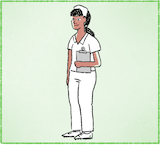



นี้คืออี่หยัง อันนี้เป็นโลงบาน
อันนี้คือเอิ้นว่าโลงบาน หลือว่าโลงพะยาบาน
ส่วนมากแล้ว พุใดสิเฮ็ดงานอยู่ในหนี้ พุใดสิเฮ็ดงานอยู่ในโลงบานนี้ คนที่เฮ็ดงานอยู่ในหนี้กะสิมีแต่หมอ มีแต่พะยาบาน หลือมีอีกหลายหน้าที่ที่แตกต่างกันไป
อาดสิมีแม่บ้าน หลือว่ามีญาม หลือคนลับส่งคนไข้กะได้
แล้วโลงบานนี้ หลือว่าหม้องนี้ ส่วนมากแล้วพุใดสิมาหนี้ ส่วนมากแล้วคนปกกะติเขาสิบ่ค่อยไปโลงบาน เพาะว่าคนที่ไปโลงบานนี้ กะมีแต่พุป่วย หลือว่าคนไข้ คนที่บ่ซำบาย แล้วกะคนที่ตวดโลกตวดพัยนั้นหละ
6
นี้คืออี่หยัง อันนี้เป็นลดโลงบาน หลือว่าลดลับส่งคนไข้
อยู่เทิงหลังคาลดนั้น เขาเอิ้นว่าอี่หยัง เขาเอิ้นว่าหวอ เป็นหวอ
แล้วหวอนี้มีไว้เฮ็ดหญัง หวอนี้กะค้ายๆ กับลำโพง เอาไว้ถ้าส่งเสียง หลือเปิดเสียง เพื่อให้คนได้ญินว่านี้คือเสียงลดโลงพะยาบาน หลือว่าลดลับส่งคนไข้
กะอาดสิเป็นสันญะลักบอกว่าให้หลบทาง ให้หลบทางไปแน่ ให้หลบทางไปก่อน อันนี้เป็นลดโลงบาน มีคนป่วยอยู่ในหนี้ หลบทางให้แน่ หลบทางไปให้แน่
แล้วลดคันนี้ หลือว่าลดโลงบานนี้ กะสิเป็นค้ายๆ กับลดตู้เนาะ คันบักใหญ่ คันใหญ่อยู่ เพื่อที่สิสามาดให้คนป่วยหลือคนไข้นอนได้
แล้วอยู่ข้างๆ ลดกะสิติดอุปะกอนต่างๆ หลือติดสันญะลักต่างๆ เพื่อที่สิให้คนฮู้ว่า นี้คือลดโลงบาน นี้คือลดคนป่วย นี้คือลดคนไข้ หลือติดสันญะลักของโลงบานหนั้นหละ
7
นี้คือพุใด อันนี้เป็นหมอ เขาเอิ้นว่าคุณหมอ
หน้าที่ของหมอนี้เฮ็ดอี่หยัง หมอนี้กะมีหน้าที่ลักสาคนป่วย ลักสาคนไข้ ลักสาได้หลายโลก
แล้วกะแล้วแต่หมอพ้อม แต่ละหมอกะเฮ็ดหน้าที่บ่คือกัน บางหมอกะลักสาโลกไต บางหมอกะลักสาโลกตับ บางหมอกะเป็นหมอฟัน บางหมอกะเป็นหมอผิวหนัง แล้วแต่หมอ แล้วแต่เพิ่นสิลักสาด้านใด
8
อันนี้คือพุใด อันนี้เป็นพะยาบาน เป็นนางพะยาบาน
นางพะยาบานนี้มีหน้าที่อี่หยัง กะมีหน้าที่ดูแลคนไข้คือกัน
แต่ว่าสิมีหน้าที่น้อยกว่าหมอ อาดสิดูแลคนป่วย ดูแลคนไข้ เอายาให้คนไข้กิน หลือว่าตวดเซ็กล้างกายของคนไข้หนั้นหละ
สิมีหน้าที่หลือบดบาดน้อยกว่าคุณหมอ
Link to overview page
Link to dictionary
| Isaan | Pronunciation | Tones | Thai | English/Notes |
|---|---|---|---|---|
| นี้ | ni: | HF | นี้ | 1. this 2. here |
| คือ | khʉ: | HR | คือ | 1. to be, to resemble, like, as 2. why {บักหล้าคือบ่เก็บโต่ะแน่ = [addressing a young boy] Why haven't you cleared the table?} |
| อี่หยัง | i:-yaŋ | H-M | อะไร | 1. what {นี้คืออี่หยัง = What is this?} {มื้อนี้เจ้าเฮ็ดอี่หยัง = What are you doing today?} {กินเข้างายกับอี่หยัง = What did you have for breakfast?} 2. something, anything, (in negations) nothing {บ่ต้องเฮ็ดอี่หยังอีกเลยนอกจากใส่ปุย = [we] don't need to do anything besides adding fertilizer} |
| อัน | an | M | อัน | 1. thing, object 2. general clf. for objects |
| เป็น | pen | M | เป็น | 1. to be, to exist 2. to be able to 3. to suffer, sth. happens to 4. เป็นหญัง[...]คือ in initial position: why? {เป็นหญังเขากะคือแปงฟัน = Why is he brushing his teeth?} {เป็นหญังเคี่ยงบินมันคือสิตก = Why is the airplane falling down?} |
| โลงบาน | lo:ŋ-ba:n | HR-M | โรงพยาบาล | hospital Notes: variant of โลงพะยาบาน |
| เอิ้น | ə:n | HF | พูด, เรียก | to call, to say {เอิ้นง่ายๆ ว่า = in other words} {คนอี่สานเอิ้นว่า เป็นลูกคนกก = Isaan people call her ลูกคนกก} |
| ว่า | wa: | H | ว่า | 1. that, as {คำว่า X = the word X} 2. to say |
| หลือ | lʉ: | M | หรือ | or |
| โลงพะยาบาน | lo:ŋ-pha-ya:-ba:n | HR-H-M-M | โรงพยาบาล | hospital |
| ส่วนมาก | su:an-ma:k | H-HF | ส่วนมาก | mostly, usually, generally |
| แล้ว | lɛ:o | HF | แล้ว | 1. finished 2. already 3. and then, and next (especially แล้วกะ) 4. auxiliary for past tense |
| พุใด | phu-dai | H-M | ใคร | 1. who {มีพุใดโทมากะบ่ลู้ = I don't know who has called} {ห้องนอนของพุใด = whose bedroom (is this)? } 2. someone, somebody, anybody, in negative context: nobody {บ่มีพุใดอยู่กับเขาเลย = there's nobody with him} |
| สิ | si | M | จะ | future tense auxiliary {เขากำลังสิตื่น = he's about to wake up} {สิไปตะหลาด = [I'm] going to the market} |
| เฮ็ดงาน | het-ŋa:n | H-HR | ทำงาน | to work |
| อยู่ | yu: | H | อยู่ | 1. to be (located) at 2. yet, still 3. auxiliary indicating continuous or progressive action {ทอดปาอยู่ในกะทะ = (in the process of) frying a fish in the pan} {แม่กำลังเมี้ยนเฮียนอยู่ = mother is cleaning/tidying up the house} |
| ใน | nai | HR | ใน | in, within |
| หนี้ | ni: | LF | นี่ | here |
| คน | khon | HR | คน | person, people |
| ที่ | thi: | H | ที่ | 1. that, which {คนที่ยืนอยู่ฝั่งขวา = the person which is standing on the right = the person standing on the right} {เว้าคำที่บ่สุพาบ = to speak words which are impolite = to speak impolitely} 2. for ordinal numbers {ที่สาม = third} |
| กะ | ga | M | ก็ | 1. then, consequently 2. also |
| มี | mi: | HR | มี | 1. to have 2. there is |
| แต่ | tɛ: | H | แต่ | 1. but {แต่บ่ต่างกันหลาย = but not very different} {แต่บ่ลู้ว่าเขาญ่างมาแต่ใส = but [I] don't know where he's coming from, see also: แต่ว่า} 2. only {ตอนนี้มีแต่ขี้ฝ้า = now there are only clouds} |
| หมอ | mɔ: | M | หมอ | 1. doctor, physician 2. guy, person |
| พะยาบาน | pha-ya:-ba:n | H-M-M | พยาบาล | nurse Notes: see also นางพะยาบาน |
| อีก | i:k | LF | อีก | 1. more, again 2. other, another |
| หลาย | la:i | M | เยอะ, มาก | many, much, very |
| หน้าที่ | na:-thi: | LF-H | หน้าที่ | duty, responsibility, obligation, function |
| แตกต่าง | tɛ:k-ta:ŋ | LF-H | แตกต่าง | different, dissimilar |
| กัน | gan | M | กัน | mutual, each other, with another, together {เขากำลังนั่งเว้ากัน = they're sitting and talking} {เขาสองคนฮักกัน = they love each other} {ปาสองโตนี้ ใหญ่ห่างกันหลายบ่ = These two fish here, are they very different in size (from each other)?} {ต่างกัน = to be different (from each other)} {ก่องอันไหนหนักกว่ากัน = Which box is heavier (than the other(s))?} |
| ไป | pai | M | ไป | 1. to go 2. auxiliary indicating action extending into the future |
| อาด | a:t | LF | อาจ | 1. might, may, will 2. likely |
| แม่บ้าน | mɛ:-ba:n | H-HF | แม่บ้าน | 1. housekeeper 2. housewife |
| ญาม | ɲa:m | HR | ยาม | security guard |
| ลับส่ง | lap-soŋ | H-H | รับส่ง | to transfer, to pick up and bring passengers to their destination |
| คนไข้ | khon-khai | HR-LF | คนไข้ | patient, inpatient |
| ได้ | dai | HF | ได้ | 1. can 2. to get, to obtain 3. before verb: indicating past tense 4. บ่ได้ + verb: not |
| หม้อง | mɔŋ | LF | ที่, แห่ง, บริเวณ | 1. place, area {หลายที่หลายหม้อง = in many places} {หม้องใดหม้องหนึ่ง = some place} 2. clf. for places |
| มา | ma: | HR | มา | 1. to come 2. auxiliary expressing action towards the present or focal time {กะคุเฮ็ดมาจากอี่หยัง = What is the bucket made of?} {แล้วเขากะเก็บเงินจากพุนั้นมา = and then she takes the money of that person} |
| ปกกะติ | pok-ga-ti | M-M-M | ปกติ | 1. normal, usual 2. normally, usually |
| เขา | khao | M | เขา | personal pronoun: he, she |
| บ่ค่อย | bɔ:-khɔ:i | H-H | ไม่ค่อย | not so (much) {เบิ่งบ่ค่อยออก = I can't really see it clearly} |
| เพาะว่า | phɔ-wa: | H-H | เพราะว่า | because |
| พุป่วย | phu-pu:ai | H-H | ผู้ป่วย | patient, sick person Notes: see also คนป่วย |
| บ่ | bɔ: | H | ไม่ | 1. no, not 2. question particle, transforming a statement into a question Notes: spelling exception in line with common usage on social media |
| ซำบาย | sam-ba:i | HR-M | สบาย | comfortable, feel good |
| ตวด | tu:at | LF | ตรวจ | to check, to inspect |
| โลก | lo:k | HF | โรค | disease, illness |
| พัย | phai | HR | ภัย | danger, risk, harm, threat |
| นั้นหละ | nan-la | HF-M | นั่นแหละ | auxiliary for emphasis at the end of a phrase |
| ลดโลงบาน | lot-lo:ŋ-ba:n | H-HR-M | รถพยาบาล | ambulance Notes: see also ลดโลงพะยาบาน |
| ลดลับส่ง | lot-lap-soŋ | H-H-H | รถรับส่ง | shuttle bus |
| เทิง | thə:ŋ | HR | บน | 1. on, on top of, at, in {เทิงโต่ะ = at/on the table} {กบมันนั่งอยู่เทิงใบบัว = the frog is sitting on the lotus leaf} {เทิงท้องฟ้า = in the sky} {มันแล่นอยู่เทิงลาง = [the train] runs on rails} {มีคนนั่งอยู่เทิงลดสามล้อสามคน = there are three people sitting in the tuk tuk} 2. up, upward Notes: pronunciation: also realized as ทัง |
| หลังคา | laŋ-ka: | M-HR | หลังคา | roof |
| ลด | lot | H | รถ | 1. car, motorized vehicle 2. vehicle, cart {ลดขายแนวกิน = food cart} |
| นั้น | nan | HF | นั้น | that, there |
| หวอ | wɔ: | M | หวอ | 1. siren 2. sound of a siren |
| ไว้ | wai | HF | ไว้ | 1. to keep, to put, to place, to retain, to save, to reserve {เขาเอาหัวของเขาไว้ใส = Where does she put her head?} {หมาสิเลี้ยงไว้บ้าน = dogs are kept/raised in the house} {ไก่เลี้ยงไว้ในคอก = chicken are kept/raised in a coop} {หน้ามันบังไว้ = the face is covered/not visible} {เขาเอาโทละสับวางไว้หู = he holds the phone to his ear} 2. for {นาลิกาปุกมีไว้เฮ็ดหญัง = What is an alarm clock for?} {หม้อเอาไว้เฮ็ดแนวกิน = a pot is used to make food} {ก่องเอาไว้เฮ็ดหญัง ก่องเอาไว้ใส่ของ = What is the box for? It's for putting in stuff.} Notes: see also ไว้ถ้า |
| เฮ็ด | het | H | ทำ | to do, to make |
| หญัง | ɲaŋ | M | อะไร, เป็นหญัง = ทำไม | 1. what {เขากำลังเฮ็ดหญัง = What is he doing?} {ธูปเอาไว้เฮ็ดหญัง = What are incense sticks for?} 2. something, anything, (nothing) 3. เป็นหญัง[...]คือ in initial position: why {เป็นหญังเขาคือใส่บักพิกลงไปในกวยเตียว = Why is he putting chili in [his] noodle soup?} {เป็นหญังหน้าต่างมันคือเปิด = Why is the window open?} {เป็นหญังมันคือมีควนไฟ = Why is there smoke?} |
| ค้าย | kha:i | HF | คล้าย | to resemble, to be similar, to be alike {ทัพพีเป็นค้ายๆ กับซ้อน = a ladle is similar to a spoon} |
| กับ | gap | M | กับ | 1. and {ลุงกับป้า = uncle and aunt} {กวยเตียวหมูกับกวยเตียวไก่ = noodle soup with pork and noodle soup with chicken} 2. with, to {ค้ายๆ กับคำว่า ... = similar to the word ...} 3. prefix in front of foods {กับเข้า = side dishes eaten with rice} {เขากินกับกวยเตียว = he's eating noodle soup} |
| ลำโพง | lam-pho:ŋ | HR-HR | ลำโพง | loudspeaker |
| เอา | ao | M | เอา | to take, to give {เขากำลังเอาก่องไปซั่ง = he's taking the boxes to weigh them} {หมอกำลังเอายาให้คนป่วยกิน = the doctor is giving medicine to the patient} {เอาไว้ถ้า = is for, is used for, has the purpose of} |
| ไว้ถ้า | wai-tha: | HF-LF | usually in a positive statement or answer: is for, is used for, has the purpose of {กะทะมีไว้ถ้าทอด = a pan is for frying} {น้ำบักนาวมีไว้ถ้าปุงอาหาน = lime juice is used to season food} {ปากกามีไว้ถ้าเขียน = a pen is for writing} {กะเทียมเอาไว้ถ้าเฮ็ดแนวกิน = garlic is used to make food} {ขาเอาไว้ถ้าญ่าง = legs are for walking} {เกิบเอาไว้ถ้าใส่ = shoes are for wearing} Notes: see also ไว้ |
|
| ส่ง | soŋ | H | ส่ง | 1. to send 2. to give, to hand sth. (over), to pass 3. to bring so., e.g., to their destination {ลดปะจำทางคันนี้สิแล่นไปส่งพุโดยสาน = the bus brings the passengers to their destinations} 4. to emit (e.g., a smell, noise) {ส่งเสียง = to make a noise} |
| เสียง | si:aŋ | M | เสียง | 1. sound, noise 2. tone, voice |
| เปิด | pə:t | M | เปิด | 1. to open {เปิดหน้าต่าง = to open the window} {เปิดปะตู = to open the door} 2. to start, to switch on {เปิดไฟ = to switch on the light} {เปิดแอ = to switch on the A/C} |
| เพื่อ | phʉ:a | H | เพื่อ | for Notes: the vowel เอือ is likely to be a Thai loan; pronunciation: also realized as เพี่ย |
| ให้ | hai | LF | ให้ | 1. to give {หมอกำลังเอายาให้คนป่วยกิน = the doctor is giving the patient medicine} 2. for 3. to allow, to be allowed |
| ได้ญิน | dai-ɲin | HF-HR | ได้ยิน | to hear |
| ลดโลงพะยาบาน | lot-lo:ŋ-pha-ya:-ba:n | H-HR-H-M-M | รถพยาบาล | ambulance Notes: see also ลดโลงบาน |
| สันญะลัก | san-ɲa-lak | M-H-H | สัญลักษณ์ | symbol, mark, sign Notes: tone of second syllable to be verified |
| บอก | bɔ:k | LF | บอก | to tell, to say, to suggest, to advise |
| หลบ | lop | M | หลบ | to avoid, to evade, to dodge {หลบทาง = to give way} |
| ทาง | tha:ŋ | HR | ทาง | 1. way, direction {พุหญิงกะสิไปทางหนึ่ง พุซายกะสิไปอีกทางหนึ่ง = the woman goes one way, the man another way} {ตะเว็นไปทางใด = Where has the sun gone?} {เขาถีบจักกะย๊านไปทางหน้า = he's biking on/onward/forward} {มาเว้า มาว่าเฮาในทางที่บ่ดี = he's scolding [me], he's talking to me improperly} 2. by, through, via etc. {เว้าทางโทละสับ = to talk on the phone} |
| แน่ | nɛ: | H | แน่, บ้าง | 1. some, somewhat 2. final particle, used to ask for examples (similar to Thai บ้าง at the end of a question) {หม้อใซ้เฮ็ดอี่หยังได้แน่ = What (different things) can a pot be used for?} {น้ำอัดลมซื้อได้อยู่ใสแน่ = Where/in which places can one buy soft drinks?} 3. final particle, when giving examples {มีเทิงส้งแน่ มีเสี้ยแน่ มีเกิบแน่ = there are trousers, shirts, shoes etc.} 4. final particle, used to give a command {ไปปิดหน้าต่างให้แน่ = Close the window!} 5. final particle, acting as an intensifier, especially in the pattern ... คัก ... แน่ {สูงคักสูงแน่ = very high} {ญ้องเฮาคัก ญ้องเฮาแน่ = [he's] praising me a lot} |
| ก่อน | gɔ:n | H | ก่อน | 1. before 2. first, first of all |
| คนป่วย | khon-pu:ai | HR-H | คนป่วย | patient, sick person Notes: see also พุป่วย |
| คัน | khan | HR | คัน | clf. for cars, trains, motorbikes, boats {ลดไฟคันนี้ = this train} {ลดเก็งคันสีเขียวคันน้อย = a small green car} |
| ลดตู้ | lot-tu: | H-HF | รถตู้ | minivan, minibus |
| เนาะ | nɔ | H | เนาะ | final particle: makes the statement softer, looking for agreement |
| บัก | bak | M | 1. intensifier before adjectives {ปาโตบักใหญ่ = a (very) large fish} 2. prefix in front of fruits and vegetables {บักแตงโม = watermelon} 3. can be used as a reference for a male person of the same or younger age {บักอันนี้ = this lad} |
|
| ใหญ่ | ɲai | H | ใหญ่ | large, big |
| เพื่อที่ | phʉ:a-thi: | H-H | เพื่อที่ | in order to, so that Notes: the vowel เอือ is likely to be a Thai loan |
| สามาด | sa:-ma:t | M-HF | สามารถ | can, to be able |
| นอน | nɔ:n | HR | นอน | 1. to lie down 2. to sleep |
| ข้าง | kha:ŋ | LF | ข้าง | 1. side {มีหูจับสองข้าง = there are handles on both sides} 2. next to {วางอยู่ข้างๆ ก่องใบใหญ่ = it's placed next to the large box} {เขายืนอยู่ข้างๆ อีกพุหนึ่ง = he's standing next to another person} 3. clf. for body parts which come in pairs (eyes, ears, legs etc.) {เขามีตาสองข้าง = she has two eyes} |
| ติด | tit | M | ติด | 1. to be attached to, to be on/at {สะวิดเปิดไฟติดอยู่ข้างฝาบ้าน = the light switch is on the wall} {มันสิมีน้ำติดอยู่โตของเขา = there is water on his body} 2. to stick (to), to attach (to) |
| อุปะกอน | u-pa-gɔ:n | M-M-M | อุปกรณ์ | tool |
| ต่างๆ | ta:ŋ-ta:ŋ | H-H | ต่างๆ | different, various |
| ฮู้ | hu: | HF | รู้ | 1. to know 2. to understand Notes: equivalent to ลู้ |
| ของ | khɔ:ŋ | M | ของ | of, belonging to |
| หนั้นหละ | nan-la | LF-M | นั่นแหละ | auxiliary for emphasis at the end of a phrase Notes: possibly a variant of นั้นหละ |
| คุณ | khun | HR | คุณ | polite prefix in front of professions (also when used to address such people) {คุณหมอ = doctor} |
| ลักสา | lak-sa: | H-M | รักษา | 1. to cure, to heal, to take care of 2. to preserve, maintain, protect |
| แล้วแต่ | lɛ:o-tɛ: | HF-H | แล้วแต่ | up to, depending on |
| พ้อม | phɔ:m | HF | พร้อม | at the same time, also, too {มีตะเว็นพ้อม = the sun's out, too} {กะทะมีด้ามพ้อม = the pan has also a handle} |
| แต่ละ | tɛ:-la | H-H | แต่ละ | each {มือแต่ละข้างกะสิมีห้านิ้ว = each hand has five fingers} {แต่ละมื้อๆ = each day} |
| คือกัน | khʉ:-gan | HR-M | เหมือนกัน | 1. also, likewise, similarly {ยินดีที่ได้ฮู้จักคือกันคับ = Nice to meet you too!} 2. in negative sentences: either {บ่ลู้คือกัน = I don't know either} {จักคือกัน = I don't know (either)} |
| บาง | ba:ŋ | M | บาง | 1. some {สัดบางโตบ่มีขา = some animals don't have legs} {บางคนสิมักกินกวยเตียวแทนเข้า = some people like to eat noodle soup instead of rice (dishes)} {บางสิ่งบางอย่าง = something, anything} 2. thin |
| ไต | tai | M | ไต | kidney |
| ตับ | tap | M | ตับ | liver |
| หมอฟัน | mɔ:-fan | M-HR | หมอฟัน | dentist |
| ผิวหนัง | phiu-naŋ | M-M | ผิวหนัง | skin |
| เพิ่น | phən | H | คนอื่น, เขา, ท่าน | 1. someone, somebody 2. he, she, they 3. 3rd person pronoun used with Buddhist monks Notes: polite |
| ด้าน | da:n | HF | ด้าน | field, area |
| ใด | dai | M | ใด | 1. which, that one which, what, how {เขานั่งแบบใด เขานั่งขดตะหมาดอยู่ = How is he sitting? He's sitting cross-legged.} {ตอนใด = when?} 2. whichever, whoever {หม้องใดหม้องหนึ่ง = some place, somewhere} {ขั้นเฮาอยากตื่นญามใด เฮากะตั้งเวลาปุกญามนั้น = If we want to get up at a certain time, we set the alarm to that time} Notes: sentence-final often with a marked rising tone |
| นางพะยาบาน | na:ŋ-pha-ya:-ba:n | HR-H-M-M | นางพยาบาล | nurse Notes: see also พะยาบาน |
| ดูแล | du:-lɛ: | M-HR | ดูแล | to take care of, to look after |
| แต่ว่า | tɛ:-wa: | H-H | แต่ว่า | 1. but 2. only {ฮู้แต่ว่าเขายืนอยู่พุเดียว = I only know that he's standing there by himself} |
| น้อย | nɔ:i | HF | น้อย | 1. few, little 2. small |
| กว่า | gwa: | H | กว่า | more, more than, comparative: as, than |
| ยา | ya: | M | ยา | 1. medicine 2. drug |
| กิน | gin | M | กิน | to eat, to consume, to use |
| เซ็ก | sek | H | เช็ค | to check, to inspect, to examine |
| ล้างกาย | la:ŋ-ga:i | HF-M | ร่างกาย | body |
| บดบาด | bot-ba:t | M-LF | บทบาท | role |